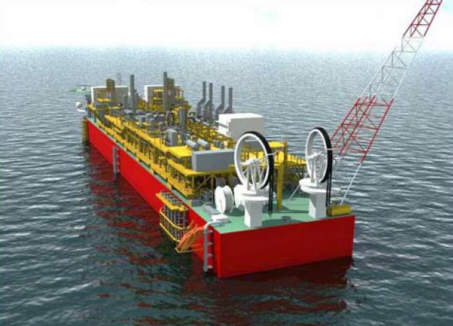|
ABB wins contract worth more than $50 million for one of
the world’s first
floating LNG facilities
Supplying safe and reliable electrical systems
to PETRONAS’
second floating liquefied natural gas facility
2015-02-05 + + + ABB, the leading power
and automation technology group, has won a contract worth more than $50
million to supply the electrical system for one of the world’s first
commercial floating liquefied natural gas (FLNG) facilities, and the
second to be owned by Malaysian oil and gas company PETRONAS. It will be
called “PFLNG2”.
The contract was awarded in the fourth quarter of 2014
by Japanese engineering contractor JGC Corporation. JGC is part of a
consortium that is building the facility for PETRONAS, along with Samsung
Heavy Industries of Korea.
Under the terms of the contract, ABB
will support the optimization of the facility’s electrical side by
designing, manufacturing and supplying transformers, switchboards,
motor-control centers and power management system. In addition, ABB will
also manage the installation of the equipment and ensure the electrical
supply is integrated with systems it is powering.
“ABB is delighted
to be selected by JGC for this pioneering project,” said Peter Terwiesch,
President of ABB’s Process Automation Division. “FLNG is a market with
great potential and we are well placed to deliver to it with our vast
experience in floating production, our extensive manufacturing base and
innovative solutions in offshore oil and gas. Our fully engineered
electrical system solution incorporates the latest technologies adapted to
the offshore environment; it is a safe solution that ensures reliable
electricity throughout the plant for the PFLNG2 to meet its demanding
performance requirements,” he added.
FLNGs have long been
considered an attractive concept, and a recent report by Douglas-Westwood
estimated the market to be worth $64 billion between now and 2020. The
agility of FLNGs allows oil and gas companies to exploit fields that would
otherwise be uneconomical, and their environmental impact is minimal
compared with conventional production platforms and pipelines.
The
PFLNG2 will be built at Samsung Heavy Industries’ yard in Geoje, Korea in
2015. When operations start in 2018, the facility will be moored over the
deepwater Rotan gas field located off the Malaysian coast. It is designed
to produce 1.5 million tons of LNG annually for at least 20 years before
it requires a dry dock.
FLNG plants resemble container ships, but
are fitted with all necessary equipment to receive, liquefy and store
natural gas extracted from offshore fields. The FLNG plant transfers LNG
at sea to carriers that deliver it directly to the markets.
The
machinery and controls supplied by ABB for PFLNG2 will be accommodated in
two electrical houses, or e-houses, that stretch as high as a five-storey
building. These prefabricated steel substations designed by ABB ensure the
equipment remains safe from the corrosive marine environment as well as
hazardous gas and provide a safe environment for the operation crew.
One particular challenge when designing systems for FLNG facilities is to
make them compact enough to fit in a confined area. Floating facilities
must include every process element of an onshore plant, including the
means to generate the power necessary to compress the gas within limited
space while still meeting demanding performance targets.
Source: ABB -
www.abb.com
|

Worldwide more than
90,000 paid subscriptions

Worldwide
more than 48,000 subscriptions -
100% one-year direct request
qualification

'What's New' in Upstream, Midstream and
Downstream Products & Services. Circulation 37,000
PennWell
Petroleum Group:
Oil & Gas Journal
Oil & Gas Journal Russia
OGJ_eNewsletter
OGJ-Website-Statistics
Oil, Gas & Petrochem Equipment
Offshore Magazine
Offshore
Russia
Offshore eNewsletter
Offshore
Website Statistics
Oil & Gas Financial Journal
+ + +
For more information, media
kits or
sample copies please contact
Andreas
Sicking
+49 (0)2903-338570
wilhelms@pennwell.com
www.sicking.de
|


